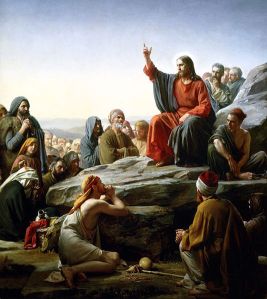God So Loved the World
from the “Crucifixion” by John Stainer
John 3:16-17
God So Loved the World
from the “Crucifixion” by John Stainer
John 3:16-17
I wanted to share this very recent setting by Luke Mayernik of the text for the Mandatum (foot washing) on Holy Thursday. We will be using it tonight – it is great because it can be fairly short or quite long (over 7 minutes!) if needed. Also, it is just a great choral setting!
“I give you a new commandment: that you love one another as I have loved you.”
This piece is on my mind at lot this week as we are singing this for a High Mass at the Basilica of Holy Hill next Thursday…enjoy the awesome Gloria Patri at the end!
Psalm 130 is a beautiful Psalm text for Lent. In my small-group yesterday, we talked a lot about the psalms, especially how great they are to pray with. Psalms make great scripture study!
Here is the text of Psalm 130:
De profundis clamavi ad te, Domine;
Domine, exaudi vocem meam. Fiant aures tuæ intendentes
in vocem deprecationis meæ.
Si iniquitates observaveris, Domine, Domine, quis sustinebit?
Quia apud te propitiatio est; et propter legem tuam sustinui te, Domine.
Sustinuit anima mea in verbo ejus:
Speravit anima mea in Domino.
A custodia matutina usque ad noctem, speret Israël in Domino.
Quia apud Dominum misericordia, et copiosa apud eum redemptio.
Et ipse redimet Israël ex omnibus iniquitatibus ejus.
Gloria Patri…
From the depths, I have cried out to you, O Lord;
Lord, hear my voice. Let your ears be attentive
to the voice of my supplication.
If you, Lord, were to mark iniquities, who, O Lord, shall stand?
For with you is forgiveness; and because of your law, I stood by you, Lord.
My soul has stood by his word.
My soul has hoped in the Lord.
From the morning watch, even until night, let Israel hope in the Lord.
For with the Lord there is mercy, and with him is plenteous redemption.
And he will redeem Israel from all his iniquities.
Glory to the Father…
I saw this excellent video posted over at the Chant Café. In it, Fr. Joseph Kramer, FSSP. provides great insight about young people and the liturgical tradition of the Church.
More and more often in my own experience, I see and hear of young people excited about the liturgical tradition of the Church, especially the tradition of Sacred Music. Young couples want to hear chant and organ at their weddings, and kids think that music that has survived many centuries is “cool.” Strong Catholic identity, especially in liturgical expression, is attractive.
How do we define beauty?
Is it “in the eye of the beholder” as many would say? How’s that for an individualist post-modern “nothing-can-be-defined” position! What about a concrete, objective definition? A great way to think of beauty, for Catholics, is that beauty is the attractive power of the truth.
Some thoughts on this from a recent experience:
In the last few weeks, I have met several people who have been totally turned off by the quest of certain people in charge of certain parishes to make the Mass “cool”. They see it as plain as day: we can never keep up with the newest, most entertaining thing. If we are trying to do that, we are totally losing the point. In terms of music, it mostly ends up sounding dated and poorly put together. One person that I met recently left the Church because of bad music after her teenage years – this was a highly trained musician who had been playing organ for Mass for many years! One day she was asked to turn it off and play basically what she recalls as a “campfire tune” instead. With multiple degrees in music, she is highly educated in the arts, and certainly knows the history of Western music, especially how intertwined it is with the tradition of sacred music in the Church. She knows that the Catholic Church has incredibly beautiful music in its tradition and today, but she can’t find it. And she’s not alone among skilled musicians – she knows several others in similar situations. She thinks she would never have left the Church if chant and polyphony had continued to be the staples of the common liturgical music diet.
In a parting comment, she said that the Church is refusing to use its most powerful tool for evangelization: beauty. Especially beautiful music.
How do we know what music is beautiful?
More soon.
Saint Meinrad Archabbey Liturgical Music
For a ton of resources (though there are MANY others too!) go check out the Liturgical Music page on the Saint Meinrad Archabbey website. You can learn about the history of chant, about Fr. Columba Kelly OSB, and find downloads of music from the Roman Missal, Propers, and all sort of fun stuff.

This week, I am privileged to be able to spend time studying individually with Fr. Columba Kelly, OSB at Saint Meinrad Archabbey. I plan on posting many of my thoughts and some of the things I learn as I delve much more deeply into the study of chant.
I have had two sessions so far with Fr. Columba. I have been blown away – what an amazing mind. I am still trying to sort out all of my thoughts – the things he says make so much sense, and yet they are paradigm shifting in many ways.
One big problem I see is that we actually really can’t even speak English well. How are we supposed to sing it (much less another language)… We must recover the art of the public speaker, it seems. We must be able to READ well. The lector is not just whoever feels like getting up and reading something; this is an ecclesiastical office, proclaiming the Word of God. It is vitally important as cantors (and choir directors, etc) that we be able to proclaim well before even putting notes to the words.
This is one thing I have been thinking about quite a bit since my first session yesterday, and I will change in what I am doing right away (both for myself and for the singers I work with).
I have many more thoughts about all of this, like that Benedictine monks are really cool. I am off to another session now, more later.
Please pray for me while I am here, as I will for you.
Beauty and the New Evangelization
An excellent piece which I came across over at the Chant Cafe. Bishop Conley on the New Evangelization:
“When we begin with beauty, this can then lead to a desire to want to know the truth of the thing that is drawing us, a desire to participate in it. And then the truth can inspire us to do the good, to strive after virtue.”
Sacred Music and the New Evangelization
An excellent post over at Corpus Christi Watershed!
IF THE CHURCH WERE TO RECLAIM the proper role and function of its very own music, it would go a long to way to repossessing the deeply influential significance of the liturgy in our everyday lives. In turn, this would most compellingly and powerfully foster evangelization.
…
THE WORD, MUSIC, AND HOW WE LIVE OUT OUR LIVES are all connected.
 Every Christian person, by virtue of their Baptism, is called to participation in the life of the Church. This participation sometimes may take the form of a vocation to the priesthood or to religious life. For those not called in that particular way, we have both the right and the duty to participation in the lay apostolate.
Every Christian person, by virtue of their Baptism, is called to participation in the life of the Church. This participation sometimes may take the form of a vocation to the priesthood or to religious life. For those not called in that particular way, we have both the right and the duty to participation in the lay apostolate.
“Since, like all the faithful, lay Christians are entrusted by God with the apostolate by virtue of their Baptism and Confirmation, they have the right and duty, individually or grouped in associations, to work so that the divine message of salvation may be known and accepted by all men throughout the earth. This duty is the more pressing when it is only through them that men can hear the Gospel and know Christ. Their activity in ecclesial communities is so necessary that, for the most part, the apostolate of the pastors cannot be fully effective without it.” (CCC 900)
The lay apostolate does not mean that lay people should do everything in the Church, and it certainly isn’t a call to do the things that are reserved to a priest. The ministry of the priesthood is a ministry to the baptized faithful; the lay apostolate is a ministry to the greater society. Sometimes the laity’s ministry includes service to their parish, in roles that are appropriate to their state in life. Often, the laity serve in many ways outside of their parish Church, in social ministries. Whatever the particular ministry is, it must always be in conformity with the Gospel and the teaching of the Church.
“Social action can assume various concrete forms. It should always have the common good in view and be in conformity with the message of the Gospel and the teaching of the Church. It is the role of the laity ‘to animate temporal realities with Christian commitment, by which they show that they are witnesses and agents of peace and justice.’ (CCC 2442)
There are many opportunities in your parish for lay people to serve both within the appropriate ministries of the Church, as well as social outreach ministries. Often, you just need to call and find out where help is needed. Are you involved in your parish? One aspect of our baptismal call is that of service, in cooperation with the ministry of the Church. How do you respond to that call?
The Catholic Faith Shines with the Light of Christ
Experiences from the pulpit, pew, & organ bench. All stories are true but the names have been changed.
"Shall I tell you the secret of the whole world? It is that we have only known the back of the world. We see everything from behind, and it looks brutal. That is not a tree, but the back of a tree. That is not a cloud, but the back of a cloud. Cannot you see that everything is stooping and hiding a face? If we could only get round in front —" G. K. Chesterton
Just a Catholic wife & mama living a life full of wonder
The words of saints and sages.
Catholic Speaker & Writer
“Our hope is found in JESUS CHRIST” : Helping Catholics rediscover their faith; whether they are non-practicing, just returning to the faith, or a weekly worshiper. Sheding light on the meaning behind what the Church teaches and believes.
A record of the journey in which I become the woman I already am
random thoughts in a Catholic life
Scripture and Catholic truth and wisdom from the early Church Fathers, Saints and Christian Writers.
Virgin most Merciful, pray for us.
Random musings of a Catholic musician and liturgist
Pater Edmund Waldstein's Blog
Random musings of a Catholic musician and liturgist
A young person's journey into the life of Christ
Random musings of a Catholic musician and liturgist
Random musings of a Catholic musician and liturgist
Random musings of a Catholic musician and liturgist
Random musings of a Catholic musician and liturgist
Random musings of a Catholic musician and liturgist